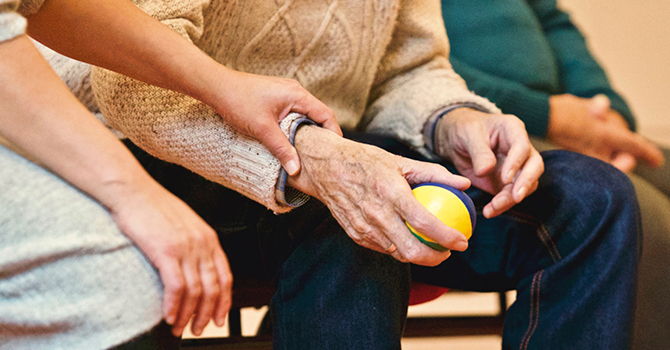How Do We Overcome the Burden of Chronic Disease for Older Adults?

Aruna Muthukumar
Master’s Student in Epidemiology
Six of ten Americans live with at least one chronic disease—heart disease, cancer,
diabetes, and others—conditions that last one year or more and require ongoing medical
attention or limit activities of daily living or both.1
Chronic illnesses are especially prevalent in certain groups like older adults, low-income
adults, and minorities. Over 85 percent of US adults aged 65 and over suffer from
at least one chronic illness and about 65–75 percent of those adults suffer from two
or more chronic illnesses.2
The risk of most chronic conditions increases with age, making older adults especially
vulnerable. Physical and mental health needs of older populations are unique, warranting
a focus on chronic disease management in the elderly. Treating chronic conditions
accounts for 85 percent of annual health care costs in the US.2
Managing the Burden on Older Adults
How can we manage this burden on older adults as well as the burden on the health
care system in cost-effective ways?
Self-management of chronic illness is a big part of the answer. Self-management is
the active management—by an individual with or without family and community support—of
symptoms, treatments, and lifestyle choices related to their condition. Management
involves taking responsibility for their behavior and changing their lifestyle by
focussing on physical, mental, emotional, and social needs in order to monitor and
manage illness and promote well-being.3
Self-management is important from the moment of diagnosis, especially for severe conditions
like cancer, which often create additional stress and fear. Treatment of any chronic
condition also exerts financial stress on patients and their families. It is critical
for patients to understand how to manage mental health issues like depression and
anxiety that may emerge during their illness.
Self-management has several benefits, but the most important are (1) empowering patients
by improving self-agency to promote a healthy lifestyles and (2) reducing the use
of health care services, which reduced health care costs.
Challenges to implementing self-management can include difficulty in coordinating
use of medications, confusion around contrasting information from their various care
providers, and lack of support from family and community. It is critical that self-management
interventions address these challenges.
Several evidence-based interventions have demonstrated success in promoting self-management
of chronic conditions in older adults.
Helpful Resources for Managing Chronic Illness
1. Chronic Disease Self-Management Program (CDSMP)
This intervention was developed at Stanford University and focuses on techniques to
deal with pain and isolation, exercise for maintaining and improving strength and
endurance, use of medications, nutrition, decision making, evaluation of new treatments,
and effective communication with family, friends, and health professionals.4
2. Program to Encourage Active, Rewarding Lives (PEARLS)
This program partners with community-based organizations and aims to promote self-management
of late-life depression in older adults. It focuses on teaching individuals the skills
necessary to make lasting life changes to reduce depressive symptoms and improve quality
of life.5
3. Prostate Cancer Foundation (PCF)
The foundation provides information and resources about prostate cancer screening,
genetic counseling, treatment options, mental health, and nutrition to support prostate
cancer patients and help them manage their condition.6
4. Diabetes Self-Management Program (DSMP)
This program was developed at Stanford University. It focuses on healthy eating, exercise,
working with healthcare providers, making action plans, sharing experiences, problem-solving,
strategies for dealing with the symptoms of diabetes, hyper/hypoglycemia, fatigue,
pain, and emotional problems such as depression, stress, and frustration.7
References
- Centers for Disease Control and Prevention. (n.d.). About Chronic Diseases. Retrieved on November 10, 2018 from https://www.cdc.gov/chronicdisease/about/index.htm
- Robert Wood Johnson Foundation. (2010). Chronic Care:Making the Case for Ongoing Care. Retrieved on November 10, 2018 from https://www.rwjf.org/content/dam/farm/reports/reports/2010/rwjf54583
- Schulman-Green, D., Jaser, S., Martin, F., Alonzo, A., Grey, M., . . . , Whittemore, R. (2012). Processes of Self-Management in Chronic Illness. Journal of Nursing Scholarship. 44(2). 136–144. doi: 10.1111/j.1547-5069.2012.01444.x
- Self-MAnagement Resource Center. (n.d.). Chronic Disease Self-Management (CDSMP). Retrieved on November 10, 2018 from https://www.selfmanagementresource.com/programs/small-group/chronic-disease-self-management/
- Health Promotion Resource Center. (n.d.). PEARLS Program. Retrieved on November 10, 2018 from https://depts.washington.edu/hprc/evidence-based-programs/pearls-program/
- Prostate Cancer Foundation. (n.d.). Living with Prostate Cancer. Retrieved on November 10, 2018 from https://www.pcf.org/patient-resources/living-prostate-cancer/
- Self-MAnagement Resource Center. (n.d.). Diabetes Self-Management (DSMP). Retrieved on November 10, 2018 from https://www.selfmanagementresource.com/programs/small-group/diabetes-self-management/
ABOUT THE AUTHOR
 Aruna Muthukumar is a second-year master’s student in Epidemiology at Michigan Public
Health. In 2017 she obtained her bachelor’s degree in biotechnology. She is passionate
about using quantitative analysis to spot trends in clinical data and generate evidence
to solve healthcare problems. She believes that decoding the patterns and mysteries
hidden in medical data has the power to revolutionize healthcare.
Aruna Muthukumar is a second-year master’s student in Epidemiology at Michigan Public
Health. In 2017 she obtained her bachelor’s degree in biotechnology. She is passionate
about using quantitative analysis to spot trends in clinical data and generate evidence
to solve healthcare problems. She believes that decoding the patterns and mysteries
hidden in medical data has the power to revolutionize healthcare.
